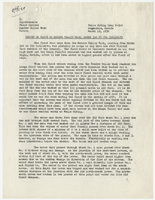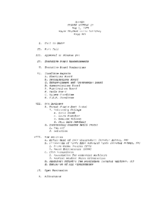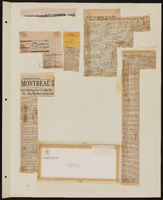Search the Special Collections and Archives Portal
Search Results

Report on flood in Meadow Valley Wash, March 3rd to 5th inclusive, March 12, 1938
Date
Archival Collection
Description
Summary of the damage from a flood in the Moapa Valley on March 3-5, 1938
Transcribed Notes: Transcribed from handwritten text on pg. 3: "West of the Flood Channel and on west side of Highway except for a few acres west of Highway and East of Channel in Logandale above point where Highway bridge crosses Channel. # 10 acres early vegetables were silted over lightly making them unfit for shipment. About 5-10 acres will need re-leveling. One of the most important aspects of the entire experience, that of the supervisory personnel getting this lesson which could not be learned without just such an object lesson."
Text

Meeting minutes for Consolidated Student Senate University of Nevada, Las Vegas, April 2, 1987
Date
Archival Collection
Description
Text

Meeting minutes for Consolidated Student Senate University of Nevada, Las Vegas, February 14, 1991
Date
Archival Collection
Description
Text

Meeting minutes for Consolidated Student Senate, University of Nevada, Las Vegas, May 1, 1979
Date
Archival Collection
Description
Text
Robert Scott Hooper Photographs [UNPROCESSED]
Identifier
Abstract
This collection is unprocessed; see the access note for additional information. The Robert Scott Hooper Photographs (approximately 1960-2019) consist of photographic negatives, positives, prints, Polaroids, 16mm films, videos, business records, correspondence, drawings, and ephemera. The collection was created by prolific photographer Robert Scott Hooper and his longtime business partner and wife, Theresa Holmes. The couple's life and business was based in Las Vegas, Nevada. Hooper's work focused on the female form, encompassing many areas of interest including sexual entertainment, modeling, pornography, and Las Vegas entertainment. Hooper was a contributing photographer with Playboy and Vegas Visitor magazines. Hooper also photographed many celebrities, Las Vegas production shows, notable events like hotel implosions, and the development of the Las Vegas Strip, including early time-lapse work on the Luxor Hotel and Casino and The Venetian. This collection also includes business records, model contracts, and correspondence.
Archival Collection

Lindsay Wenger oral history interview: transcript
Date
Archival Collection
Description
Oral history interview with Lindsay Wenger conducted by Barbara Tabach on March 13, 2018 for the Remembering 1 October Oral History Project. In this interview, Lindsay Wenger discusses her move to Las Vegas, Nevada in 2013 for her residency at the University Medical Center of Southern Nevada (UMC). She talks about her experience on the night of the October 1, 2017 mass shooting and recalls a few specific patients she treated throughout the night and into the morning. After discussing the events at the hospital, she explains how she has been emotionally affected and how her view of Las Vegas as a community has changed.
Text

Transcript of interview with Richard Erbe by Marcela Yepes, March 19, 1978
Date
Archival Collection
Description
On March 19, 1978, Marcela Yepes interviewed Richard Erbe (born 1922 in El Monte, California) about his experiences in Las Vegas, Nevada and specifically about his career in education. Erbe first talks about his family background and German ancestry before describing how he ended up moving to Nevada. He then describes his wife’s father’s background in the gaming industry and some of the early illicit casinos that existed in California. The interview shifts to Erbe’s educational background, his first teaching position as a fifth grade teacher, his experience in the military, and his reasoning for not seeking employment in the gaming industry. The two also discuss church activity, politics, and social activities in Las Vegas. The latter part of the interview includes Erbe’s viewpoints on the issues in the educational system, his experiences as a principal at multiple Clark County schools, and some of the challenges he encountered in the administrative side in the field of education.
Text

Interview with Stephen Craig Ronshaugen, November 26, 2004
Date
Archival Collection
Description
Text


